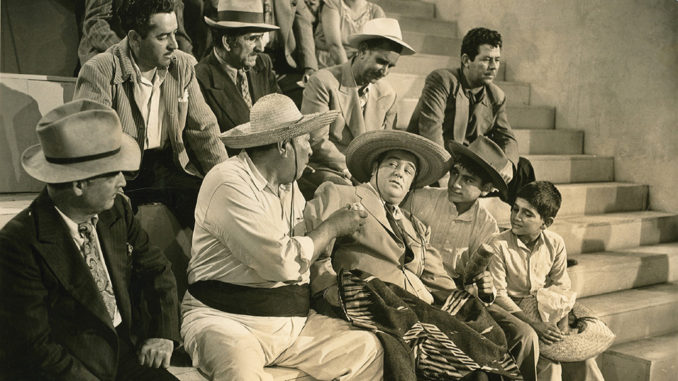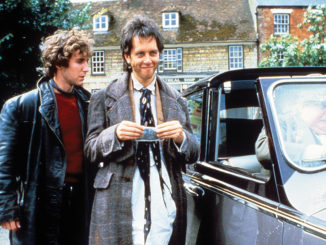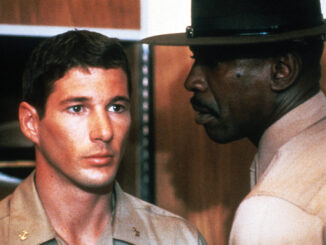
By Bill Elias
In June 1948, I was ten years old, living in the then-small town of North Hollywood, California. Summer vacation was just beginning and I was excited to escape from the confinement of school. I loved my school-free summers. I would go to the movies, play at the park, go swimming, collect soda pop bottles and pick apricots from trees on empty lots to sell for extra money. Watching wrestling matches on our new 10-inch black-and-white television topped it all. My summer was going great––and it was about to get better.
After dinner, one evening, Mom and Dad asked if I would like to work as a child extra in the new Bud Abbott and Lou Costello movie, Mexican Hayride, along with my 14-year-old brother, Bob.
My dad owned a magazine, candy and cigar store at Universal and I knew that he was a close friend of Costello’s. In 1942, my dad’s stiff hip had become increasingly complicated by arthritis. An operation was needed in order to save his leg, but the cost was $5,000––more than the cost of a three-bedroom house at the time. Lou called the doctor and arranged the operation. Not only did he pay for the operation and hospitalization, he shamed the studio into giving my mom a weekly check for ten weeks.
After each take, we were getting sicker and sicker-looking. The crew, led by Lou Costello and the director, Charlie Barton, would laugh harder and harder each time he yelled, “Cut!” and “Run, kids!” I think they did seven takes just for laughs.
So, even though I was around the studio, went to the studio picnics, attended the unforgettable children’s Christmas parties and, from time to time visited Costello’s home with my dad, I never thought that I would ever actually work in a movie and get paid $15.56 a day. That was equal to collecting 778 soda pop bottles or selling 103 bags of apricots. They made me an offer I could not refuse.
Mexican Hayride was adapted from the musical play by Herbert and Dorothy Fields and Cole Porter. It played in New York City for 16 months from 1944 to 1945. This was Abbott & Costello’s 23rd movie since 1940. Costello plays Joe Bascom, aka Humphrey Fish. Harry Lambert (Abbott) cons Joe into cheating friends in Iowa, and Joe follows him into Mexico to retrieve the money.
With two detectives on their trail, Joe enters the bullfight stadium and sits between our on-screen Mexican father and my brother Bob and me. We are eating garlic and salami. When we passed the salami and garlic by Joe to our father, Joe would get a whiff and look sick. The salami was the worst and the garlic was in cloves. Bob and I would have to run outside after every take to spit out what we didn’t swallow. After each take, we were getting sicker and sicker-looking. The crew, led by Costello and the director, Charlie Barton, would laugh harder and harder each time he yelled, “Cut!” and “Run, kids!” I think they did seven takes just for laughs.
As the story progresses, Joe accidentally becomes the amigo Americano, a good will ambassador, and Harry, who is trying to hatch an elaborate silver mine scam, has Dagmar, a beautiful Mexican singer (Luba Malina, who was also in the play) slip Joe a special speech extolling Mexico’s abundant mineral resources. Eventually, Dagmar and Harry relinquish the conned money and all is forgiven. Joe and Harry, along with Dagmar, happily return to the States in a donkey cart.
On December 4, 1948, my brother and I went to Hollywood to see Mexican Hayride at the Pantages Theatre. We were in the balcony, and as our scene was coming up, we couldn’t help but notice a heavyset lady wobbling down the aisle. Just as our on-screen characters were passing the salami, she sat down, and at that precise second, the theatre shook––due to a 6.0 earthquake in Desert Hot Springs! We laughed so hard I couldn’t finish my popcorn. The mood was set for us to laugh throughout the entire movie.
My brother Bob quit working as a child extra after one movie because he was too big to pass as a child. I continued to work in 24 Universal movies until I was 14. I was an Arab, an Italian, a Mexican, an Indian and a Jewish refugee. When I wasn’t working on a movie, I was at the studio every day after school and during summer vacations, working with my dad in his store and catering truck. I loved every minute of it and I will always cherish the memories.
Mexican Hayride changed my life and introduced me to the movie business. I was honored to work with a man I will always remember and love, and to whom I’ll always be grateful––my dad’s best friend and our family angel, Lou Costello.





